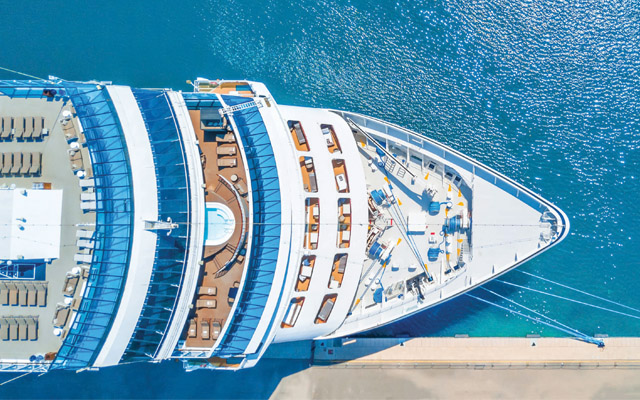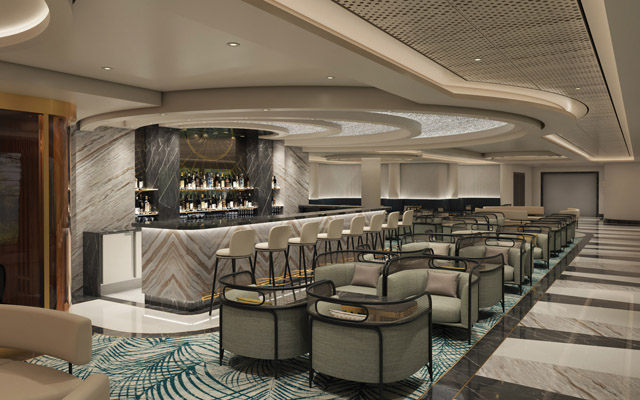Often accused of their heavy carbon footprint, cruise lines now dedicate much of their resources to sustainable operations
One of the world’s leading cruise companies, the Royal Caribbean Group was in on the sustainability game 30 years ago, long before sustainable tourism became a trendy mainstream conversational topic. Its Save the Waves programme continues today, and is recently joined by Destination Net Zero, which aims to reach net zero emissions by 2050.
Commenting on the new announcement, Angie Stephen, vice president and managing director, Asia-Pacific, Royal Caribbean International, told TTG Asia: “This is a bold mission that will require a mix of solutions including rolling out new technology across our fleet, building more efficient ships, developing alternative fuel sources, and working across industries to develop new solutions that don’t even exist today.”

Come 2023, the group’s Royal Caribbean International cruise brand will launch its first ship powered by Liquefied Natural Gas (LNG), Icon of the Seas. The second LNG-powered ship, Utopia of the Seas, will set sail in 2024.
Committed to building one new ship every year for the next decade, the group is future-proofing its portfolio through fuel flexibility, energy-saving technologies and innovation to ensure each new ship class is 20 per cent more energy-efficient than its predecessor.
Presently, it is already leveraging best-in-class technology such as AI-based engine optimisation to improve speed and fuel efficiency. The air lubrication system on its ships is also designed to reduce drag when sailing to augment energy efficiency.
Thanks to significant upgrades in its heating, ventilation, and air conditioning, vessels now also utilise 40 per cent less energy than previous iterations.
Apart from developing waste management technologies, the full fleet is equipped to be landfill-free.
Roughly 90 per cent of the freshwater used onboard is produced via desalination plants and processes, and the group is taking water conservation further by using aerators and low-flow showerheads to cut usage.
The group will also incorporate more sustainable fuels and use hybrid fuel cells that allow for zero emission.
In a similar green vein, Norwegian Cruise Line (NCL) drives positive impact on society and the environment through its global sustainability programme, Sail & Sustain.
Operating across all three brands within Norwegian Cruise Line Holdings (NCLH), the comprehensive initiative is centred on five pillars – reducing environmental impact; sailing safely; empowering its people; strengthening its communities; and operating with integrity and accountability.
Like Royal Caribbean Group, NCLH is also pursuing net zero emissions by 2050 across its operations and value chain. This year, NCLH joined the Methanol Institute to assess the feasibility of retrofitting existing engines to operate with dual fuels – diesel and methanol – with the aim of trialling methanol usage by 2025.
It has also established a target for approximately 70 per cent of the ships in its complete fleet to be equipped with shore power capabilities by 2025.
In the short term, the company has committed to offset three million metric tons of carbon dioxide equivalent over a three-year period to 2023 to bridge the gap in its decarbonisation efforts.
Identifying a tangible achievement specific to NCL, Braydon Holland, senior director, Asia, said 14 million single-use plastic water bottles and over 50 million plastic straws were removed from potential environmental harm through partnerships such as Flow Water, which uses sustainably produced paper-card packaging and a plant-based cap.
NCL’s brand-new Prima Class of ships offer a wide range of sustainability features, with technologies such as a nitrogen oxide reduction system (SCR) that cuts the ship’s overall environmental impact. They will also be equipped with an Exhaust Gas Cleaning System (EGCS), an Advanced Wastewater Treatment System to treat and clean all wastewater to meet stringent international standards, and Cold Ironing functionality to connect to onshore power grids to reduce emissions further while in port.
NCL’s responsible tourism efforts can be supported by guests when they patronise the sustainably-focused Metropolitan Bar onboard Norwegian Prima. It boasts zero-waste cocktails prepared with surplus ingredients, as well as a collection of sustainable spirits and biodynamic wines.
A recent survey among its guests revealed that up to 55 per cent rate environmental and sustainability policies as a very important factor when selecting a cruise line.
New-to-market Resorts World Cruises (RWC) also adheres to sound environmental practices in its operations, including increasing energy efficiency and recycling, conserving fuel and water, reducing solid waste generation, protecting marine life, and preventing oil pollution.
For instance, its ship is equipped with Eniram trim optimisation; and the exterior hull coating system incorporates the most advanced silicone-based paint to decrease drag for better fuel efficiency. The vessel also uses an EGCS to minimise emissions.
Besides, the company follows the highest marine industry standard where its bio-waste treatment system is equipped with dryers to incinerate or bag waste materials for offloading and disposal.
RWC president Michael Goh told TTG Asia: “Customers’ expectations of conscious travel and carbon impact are definitely shaping sustainable cruise operations. It’s important for cruise lines to be at the forefront in developing and executing responsible environmental practices, and to lead by example.”

Shore excursions that care
With shore excursions forming a big part of the complete cruise experience, cruise companies are also making sure that their sustainable cruising promises are kept on land.
To date, Royal Caribbean Group offers more than 2,000 Global Sustainable Tourism Council-certified tour destinations.
NCL’s new Go Local series of destination tours take guests into local communities and offer immersive experiences such as spending time at a goat farm to learn the generations-old way of making cheese, and fishing with residents.
A partnership with Alaska Native-owned Huna Totem Corporation has created authentic and sustainable ways to explore the region. This in turn provides jobs for the locals and maintains the area’s heritage and cultural values.
On RWC’s part, tour options with lower carbon footprint, such as touring on foot or on trishaws, are encouraged, and so are visits to nature and heritage sites.
Goh noted that there is heightened interest among cruise customers in such shore excursions, as well as those that are immersive and allow guests to interact with communities in the destination.




















